Acne Scar Treatment for Dark Skin
Acne scars develop from inflammatory acne lesions that cause permanent damage to the underlying tissues. These acne scars can appear either depressed or raised, depending on the amount of collagen produced during the skin’s healing process. Individuals with darker skin are especially susceptible to post-inflammatory hyperpigmentation, characterized by dark, flat marks left from previous acne lesions. Treating acne scars can be particularly difficult, often more so than handling the initial acne outbreak, leading to feelings of frustration. Furthermore, finding safe and effective treatment options for acne scars can be more challenging for patients with darker skin tones, as they may risk further scarring or pigmentation. Fortunately, board-certified dermatologist Dr. Michele Green has been helping patients of all skin types and tones for over two and a half decades and has the expertise to help you achieve clear, radiant skin.
Acne scars come in different forms, which means a single treatment won’t work for everyone. The effectiveness of each treatment method depends on the specific type of acne scar as well as the patient’s skin type and tone. Since darker skin is prone to hyperpigmentation and scarring, careful selection of minimally invasive procedures is vital for achieving safe and effective cosmetic results. Laser treatments such as eMatrix and Clear + Brilliant, microneedling, Mesopeels, and Cosmelan peels are all excellent options that are both safe and effective for darker skin tones. If you are struggling with depressed, raised, or pigmented acne scars and want to achieve a youthful-looking, smooth complexion, Dr. Green is here to assist you.
Dr. Michele Green is a world-renowned cosmetic dermatologist with over 25 years of expertise in treating skin conditions in patients of all skin types and tones, including darker skin tones. She employs the latest advancements in technology for cosmetic dermatology treatments aimed at acne scars, including various chemical peels, microneedling, subcision with dermal fillers, and laser skin resurfacing. She takes a holistic approach to cosmetic dermatology, customizing each patient’s treatment plan to their unique skin tone, type, and concerns. She is consistently rated as one of NYC’s top dermatologists by Castle Connolly, Super Doctors, New York Magazine, and The New York Times due to her expertise and dedication to her patients. When you consult with Dr. Green, you will have the chance to discover which treatment or combination of options is best suited to safely and effectively eliminate your acne scars, revealing a smooth, clear, and beautiful complexion that lasts.
What are acne scars?
An acne scar indicates permanent damage to the skin tissue caused by inflammation associated with acne blemishes. It develops when an inflamed active acne lesion becomes filled with excess oil, sebum, dead skin cells, and bacteria. As the lesion expands, the inflammation inflicts permanent trauma on the underlying skin tissue, prompting the skin’s natural wound-healing process to create new collagen fibers. Acne scars can develop due to an underproduction or overproduction of collagen during this process.
What are the different types of acne scars?
Acne scars fall into two main categories: atrophic and hypertrophic scars. Atrophic scars form when insufficient collagen production is produced during the wound-healing process. These scars appear as depressions or indentations in the skin. Atrophic scars can be further classified as ice-pick scars, boxcar scars, or rolling scars. Ice-pick scars appear as narrow, deep V-shaped indentations in the skin. Boxcar scars appear as oval or round-shaped with well-defined edges. Rolling scars are shallow scars that appear to have wave-like edges. Hypertrophic or keloid scars form due to an overproduction of collagen during the healing process. These scars appear as raised and can sometimes grow larger than the initial acne lesion.
What is post-inflammatory hyperpigmentation?
Post-inflammatory hyperpigmentation (PIH) specifically refers to the dark spots that may remain after an acne lesion or another inflammatory skin condition has healed. The color of these spots can vary, appearing as brown, black, red, pink, or purple patches on the skin, depending on the individual’s skin tone. During the natural healing process, the cells involved in healing the area may cause an overproduction of melanin, leading to the formation of hyperpigmented spots. Post-inflammatory hyperpigmentation may fade on its own, but it may also require treatment through targeted skincare products and in-office cosmetic procedures to lighten the PIH and discolored areas of the skin.
How do acne scars heal on dark skin?
Scar tissue develops as part of the body’s healing process after an injury, infection, burn, or inflammation. During natural healing, collagen fibers create tissues that knit the skin back together to repair the wound. This developing tissue helps protect the damaged area from infection, and it is this tissue that can lead to the formation of a scar. When excess collagen is produced, the result is a keloid or hypertrophic scar. Conversely, if insufficient collagen is produced, it leads to an atrophic scar. Scars can be either darker or lighter than the surrounding skin, known as hyperpigmentation and hypopigmentation, respectively. Atrophic scars are the most common type of acne scars, regardless of skin tone. However, patients with skin of color are often more susceptible to developing keloids or hyperpigmentation from acne scarring.
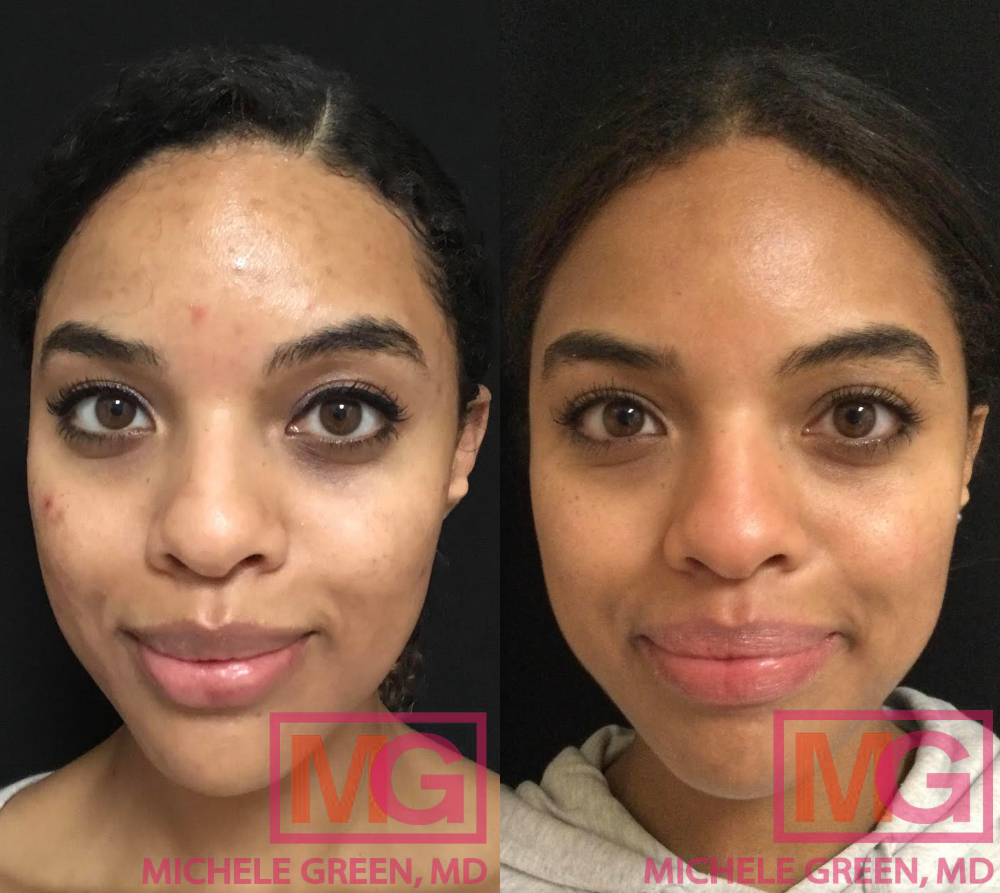
Acne & dark spot treatment – 5 months
How long does it take for acne scars to go away?
Acne scars will not go away on their own without medical intervention, as a textural acne scar indicates permanent damage to the underlying skin tissue caused by inflammation from pimples. Often, cosmetic procedures and targeted skincare products are required to fade and reduce the appearance of acne scars. The optimal combination of acne scar treatments ultimately depends on the types of scars present, the patient’s skin tone, and their skin type. Seeking acne scar treatment from an experienced, board-certified dermatologist like Dr. Green is crucial to ensure safety and effectiveness while minimizing potential side effects. After initiating acne scar treatments, it may take six months or more for them to diminish in appearance, depending on the severity of the scars. Dr. Green will regularly evaluate your progress as you undergo ongoing acne scar treatments to help you achieve and maintain a smooth, clear, and healthy complexion in a timely manner.
How does a dermatologist remove dark spots?
The best way to address dark spots on darker skin tones is to consult an expert, such as board-certified dermatologist Dr. Michele Green in NYC. With over 25 years of dermatological experience, Dr. Green tailors each patient’s treatment plan to include a unique mix of specially formulated skincare products and non-invasive, in-office treatment options. Among the most sought-after cosmetic treatments for reducing dark spots in patients with deeper skin tones are various chemical peels, microneedling combined with depigmentation serum, subcision with dermal fillers, and Clear + Brilliant laser treatment. These cutting-edge options are fast and straightforward procedures that deliver impressive results with no downtime or discomfort.
Patients with darker skin tones reap the benefits of these treatments without risking adverse reactions like hyperpigmentation or scarring. In addition to these in-office treatments, Dr. Green crafts personalized skincare plans tailored to her patients’ skin types and specific concerns, often recommending powerful yet gentle active ingredients such as vitamin C, retinoids, kojic acid, azelaic acid, and hydroquinone. When you meet with Dr. Green at her boutique dermatology office on Manhattan’s Upper East Side, she will collaborate with you to create an individualized dark spot treatment plan aimed at achieving and maintaining a bright, radiant, and even-toned complexion for the long term.
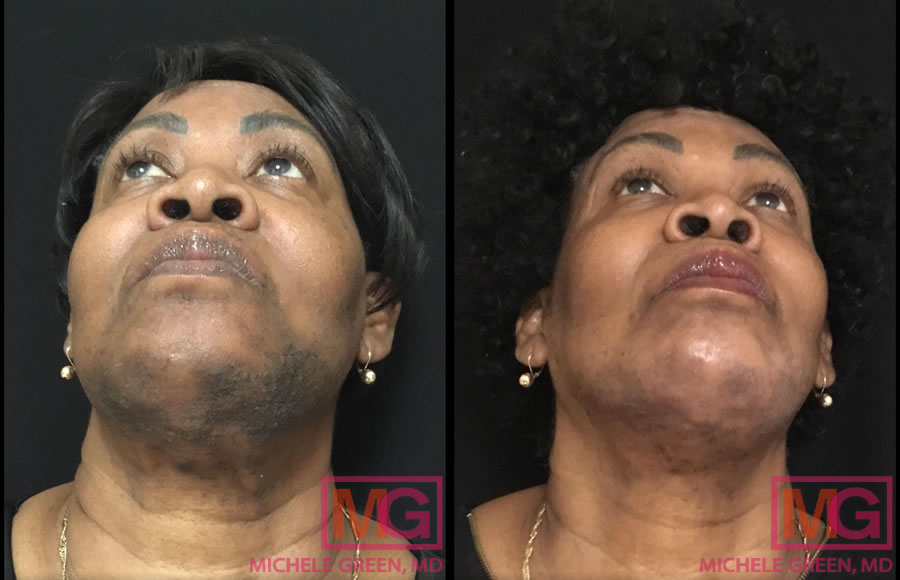
Before and after Chemical Peels (2 treatments)
Chemical Peels for acne scar treatment
A Mesopeel is a specially formulated chemical peel designed to treat facial and bodily hyperpigmentation. The Mesopeel is formulated to be gentle yet effective, ensuring safe use on sensitive areas of the body, including the axillae, inner thighs, groin, under-eye area, and face. This gentle formula makes Mesopeels an excellent treatment option for reducing hyperpigmentation and dark spots in patients with darker skin tones, who may be more prone to adverse reactions like hyperpigmentation and scarring from traditional chemical peels. Typically, patients require a series of Mesopeels every two to four weeks to achieve optimal cosmetic results. The exact number of Mesopeels needed for your treatment may depend on the area being treated and the severity of the dark spots. There is no downtime associated with the Mesopeel, allowing patients to schedule their treatment sessions easily.
The Cosmelan peel was originally designed to address melasma, a chronic skin condition marked by patches of hyperpigmented skin. Dr. Green has broadened the application of Cosmelan to include the treatment of acne scars, post-inflammatory hyperpigmentation (PIH), sun spots, and sun damage and discoloration on the face, chest, and body. The Cosmelan® peel is a professional-grade mask utilized by board-certified dermatologist Dr. Michele Green in her practice on the Upper East Side. The mask is applied for a number of hours, depending on the level of pigmentation and skin type. Patients are then instructed to remove the mask at home with a neutral, gentle facial cleanser after the allotted time has passed. After the peel application, patients will adhere to a tailored skincare regimen designed by Dr. Green to lighten the pigmentation over time. Cosmelan offers a safe and effective treatment with minimal downtime. The patient returns four weeks later for a touch-up of Cosmelan to address any lingering pigmentation.
Laser treatments for acne scars
The eMatrix laser is a distinctive treatment modality known for its ability to rejuvenate the skin and reduce the appearance of acne scars. The technology behind the eMatrix laser makes it “color blind,” which means it can safely treat both darker and lighter skin tones. The eMatrix laser employs bipolar radiofrequency energy to effectively heat the tissue beneath the skin’s surface while preserving the top layer. By bypassing the epidermis and delivering heat to the dermal layer at a deeper level, this method successfully reduces downtime and lowers the risk of potential complications such as hyperpigmentation. Each pulse of the eMatrix laser transmits radiofrequency energy through the electrode matrix, creating a controlled skin injury in the treatment area. This process activates fibroblasts in the skin, triggering a wound-healing response and promoting new collagen production. With a Sublative Rejuvenation treatment, this collagen production results in smoother, brighter, tighter, and more youthful-looking skin. Patients can expect minimal downtime with mild redness and swelling for a few days following the treatment session. Dr. Green recommends an average of five eMatrix laser treatments for atrophic scars, spaced about 4 to 6 weeks apart, to achieve the best cosmetic outcomes.
The Clear + Brilliant laser is a skin resurfacing treatment that is safe and effective for all skin types and tones, including darker skin types. Clear + Brilliant uses fractional laser energy to create thousands of controlled, microscopic injuries in the skin. This process triggers the skin’s natural healing functions, including cell turnover and collagen production. Clear + Brilliant laser treatment can improve dark spots, acne scars, fine lines, enlarged pores, and sun damage, among other skin conditions. There is no downtime associated with treatment, allowing patients to resume their normal activities immediately following treatment. Typically, about six treatment sessions are required to achieve optimal results. However, the precise number of sessions needed will depend on the initial severity of the acne scars or dark spots being treated. Dr. Green will work with you to develop a customized Clear + Brilliant laser treatment plan that aligns with your personal aesthetic goals.
Subcision with dermal fillers
Dr. Green often combines subcision with dermal fillers to reduce the appearance of deep acne scars and restore volume loss in the treatment area. This combination effectively releases fibrotic strands and simultaneously replaces lost volume, leading to an instant improvement in atrophic. Subcision, also referred to as subcutaneous incision-less surgery, is a minor surgical procedure effective in treating depressed acne scars. During the subcision procedure, a needle is utilized to sever the fibrotic strands of scar tissue that anchor the skin’s upper layers to the deeper tissue. Once the fibrotic bands of scar tissue are released, the skin is stimulated to produce new collagen in the treated area, promoting healing and resulting in a smoother, more even skin texture. A dermal filler is then injected to replenish lost volume and smooth the area further.
When performing subcision for acne scars, Dr. Green combines various dermal fillers like Juvederm®, Restylane®, or Sculptra®. Juvederm and Restylane are two fillers made with hyaluronic acid, a naturally occurring substance in the body. These hyaluronic acid fillers provide immediate volume to the skin, smoothing the appearance of acne scars. Hyaluronic acid fillers can last for six to twelve months, depending on the exact filler used. Sculptra is another dermal filler that utilizes poly-L-lactic acid to stimulate new collagen production in the injected area. Unlike hyaluronic acid fillers, Sculptra requires a series of treatment sessions spaced one month apart to achieve the best cosmetic results. Results with Sculptra, however, can last for up to two years after an initial series.
Microneedling for acne scars on dark skin
Experts across the dermatology field agree that microneedling is one of the best minimally invasive techniques for reducing the appearance of depressed post-acne scars. This treatment, often referred to as collagen induction therapy, employs tiny needles on the skin’s surface to stimulate the body’s natural wound-healing process and new collagen and elastin production. Microneedling is safe for all skin types and tones and requires little to no downtime. With each treatment, patients can look forward to improved skin texture, tone, and the appearance of acne scars. Patients typically require a series of three or more treatments spaced one month apart for optimal cosmetic results.
The micro-injuries created in the skin during the microneedling procedure enhance the absorption of specialized topical serums and skincare products, including platelet-rich plasma (PRP). PRP is a serum rich in growth factors that promotes additional regeneration at the cellular level to rejuvenate the skin, further enhancing the revitalization benefits of collagen induction therapy. It is derived from a sample of the patient’s own blood, making it 100% safe. Once the PRP is drawn, it is applied as a topical serum immediately after the microneedling device is used.
Patients interested in treating unwanted pigmentation, including post-inflammatory hyperpigmentation associated with acne scars, and correcting an uneven skin tone and texture can benefit from pairing their microneedling treatment with a topical depigmenting serum. The topical depigmenting serum used by Dr. Green contains a unique blend of powerful yet gentle skin-brightening agents, including kojic acid, tranexamic acid, and azelaic acid, that work together against melanocyte activity in the skin. The result of microneedling with depigmentation serum is an even-toned, smooth complexion with an observable reduction in hyperpigmentation. Patients enjoy that after their microneedling treatment with depigmenting serum, their skin tone is even, their face is more radiant, and they have a lasting healthy glow.
Intralesional steroid injections for keloid scars
Patients with darker skin tones are often more prone to developing keloids, or hypertrophic acne scars, from acne breakouts. Keloids form as a result of an overproduction of collagen during the body’s natural healing process. To treat keloids, Dr. Green can inject corticosteroids to shrink and flatten the scars. Intralesional steroid injections are often the only way to treat keloid or hypertrophic scars. Multiple treatment sessions may be required depending on the size and severity of the keloid scar.
Microdermabrasion for dark spots
Microdermabrasion is a procedure that effectively removes the upper layers of skin to eliminate fine lines and wrinkles while boosting collagen and elastin production in the skin. During a microdermabrasion treatment, a handheld tool with a diamond tip is utilized to physically remove dead skin cells from the surface, resulting in a smoother texture and a more even complexion. Microdermabrasion is a safer option than dermabrasion for individuals with darker skin tones, as dermabrasion involves the complete removal of the top layers of skin, requires significantly more recovery time, and involves an increased risk of scarring and hyperpigmentation.
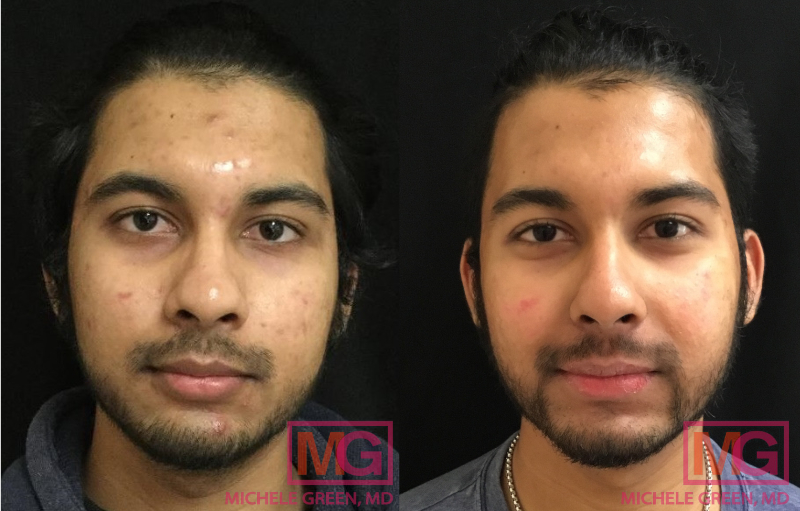
Microdermabrasion for dark spots
Microdermabrasion is a procedure that effectively removes the top layers of skin to eliminate fine lines and wrinkles while boosting collagen and elastin production within the skin. This is a safer choice than dermabrasion for darker-skinned individuals. Dermabrasion is a more ablative treatment that entails complete removal of the top layers of skin and requires significantly more downtime. During a microdermabrasion treatment, a handheld tool with a diamond tip is used to physically remove the dead skin cells on the top layers of skin, resulting in a smoother skin texture and more even-colored complexion.
How to safely get rid of pimples on black skin
Many people are eager to start treating their acne scars as soon as they appear. However, anyone who is struggling with active acne breakouts should address this concern first. It is preferable to completely resolve any active acne prior to starting acne scar treatment since any in-office treatment designed to resolve acne scars would be useless against an active inflammatory acne lesion. Any active acne can potentially lead to the creation of a new acne scar, and that is what we want to avoid! There is a myriad of treatment options available for resolving active acne, and Dr. Green will work with you to determine which acne treatment is the best for you and your skin.
For patients with darker skin tones who are looking to resolve their acne scars, Dr. Green typically recommends using gentler chemical peel formulations, V-Beam or eMatrix laser treatment, dermal fillers, or microneedling to treat acne scars. Dr. Green highly recommends the eMatrix laser to treat textural acne scars for patients with dark skin. The eMatrix™ laser is a gentle laser that is safe to use on all skin types without increasing a patient’s risk of discoloration or hyperpigmentation. As it uses radiofrequency energy to heat the dermis, its process is not pigment-based, and it’s able to stimulate new collagen formation safely.
Over a series of five eMatrix laser sessions spaced about a month apart, patients can experience full acne scar removal and improved skin texture. Additionally, please keep in mind that one of the best things you can do for yourself if you are experiencing active acne is to refrain from popping your pimples! Trying to pop a pimple will result in an exacerbation of inflammation and potentially lead to post-inflammatory hyperpigmentation. Instead, work with Dr. Green to clear up any active acne and create a personalized treatment plan to tackle the acne scars afterward.
How to choose the best at-home skincare?
Carefully curating your skincare routine is a great method for tackling acne and acne scars, as well as providing nourishing, anti-aging, and protective benefits to your skin. The first step in any skincare routine is a cleanser to keep the skin and pores clear. Dr. Green’s Gentle Cleanser from her MGSKINLABs skincare line is an excellent product for individuals with sensitive or dry skin, as it cleanses the skin without stripping it of its natural moisture. Patients with oily or acne-prone skin can use the Pore Minimizing Cleanser from MGSKINLABs. This product contains salicylic acid and glycolic acid, two hydroxy acids that soften sebum, dead skin cells, debris, and dirt, allowing for their removal from the pores while minimizing acne. They also aid in increasing the rate of skin cell turnover, meaning that discolored dead skin cells with a hyperpigmented appearance can be more quickly sloughed off than usual, revealing healthy and evenly colored skin cells.
Vitamin C is an exceptional skincare ingredient for patients experiencing uneven texture and post-inflammatory hyperpigmentation from acne scarring. Vitamin C boosts collagen production in the skin, creates an overall brightening effect, and offers antioxidant protection against harmful free radicals in the environment. MGSKINLAB’s Vita C serum features a high concentration of Vitamin C to improve skin texture and tone and deliver maximum benefits. The Skin Brightening Cream from MGSKINLABs is another excellent product for patients with post-inflammatory hyperpigmentation. The Skin Brightening Cream contains kojic acid and fruit extracts to lighten pigmentation without any irritation or increased photosensitivity.
Retinol and retinoids can help promote skin cell turnover and increase collagen production, resulting in a smoother, more even-toned complexion overall. Retinols are found over the counter, while retinoids can be obtained in higher strengths through prescription by a board-certified dermatologist. It is important to note that not every individual can tolerate a prescription-strength retinoid. It is essential to discontinue usage if any skin irritation occurs, as using the product further can result in skin damage and worsening of pigmentation. Additionally, patients must practice proper sun protection, as retinol and retinoids increase the skin’s sensitivity to the sun.
Hydroquinone is a prescription-grade skin-bleaching agent that is only available through prescription by a board-certified dermatologist like Dr. Green. Hydroquinone works to eliminate excess melanin production and reduce melanocyte activity. It is often used in tandem with chemical peels to effectively lighten dark marks on the skin, especially post-inflammatory hyperpigmentation, which can result after an acne breakout has healed. Similar to retinol and retinoids, hydroquinone should be used with caution, as patients can experience irritation with usage. Patients also must use sunscreen and practice sun protection, as hydroquinone increases skin photosensitivity.
Moisturizers are an integral part of a well-balanced skin care regimen. They help enhance and strengthen the skin’s natural protective barrier and provide essential hydration for optimal skin health. Dr. Green’s Absolute Recovery Anti-Wrinkle Cream is an excellent product for hydrating and nourishing the skin, especially after laser treatments or chemical peels. Patients with acne-prone or oily skin types can instead use MGSKINLAB’s Ultimately Sheer Lotion, which is oil-free and has been proven not to clog pores or follicles.
Sunscreen is, of course, one of the most crucial components of any skincare routine. To achieve and maintain ideal results, it is imperative that proper sun protection is utilized and sun exposure is limited, especially during and after any cosmetic treatment. Patients should look for a broad-spectrum formula that offers protection against both UVA and UVB rays and with an SPF of at least 50. The Hydrating SPF 50 from MGSKINLABs is an excellent product containing zinc oxide to protect from harmful UV rays and hyaluronic acid and lactic acid to hydrate and soften the skin. Patients struggling with post-inflammatory hyperpigmentation can layer two sunscreens, a physical and chemical sunscreen, for maximum protection against UV damage. Physical sunscreens contain ingredients like zinc oxide and titanium dioxide to create a barrier against UV rays. In contrast, chemical sunscreens contain ingredients like homosalate and octinoxate to convert harmful UV rays into heat.
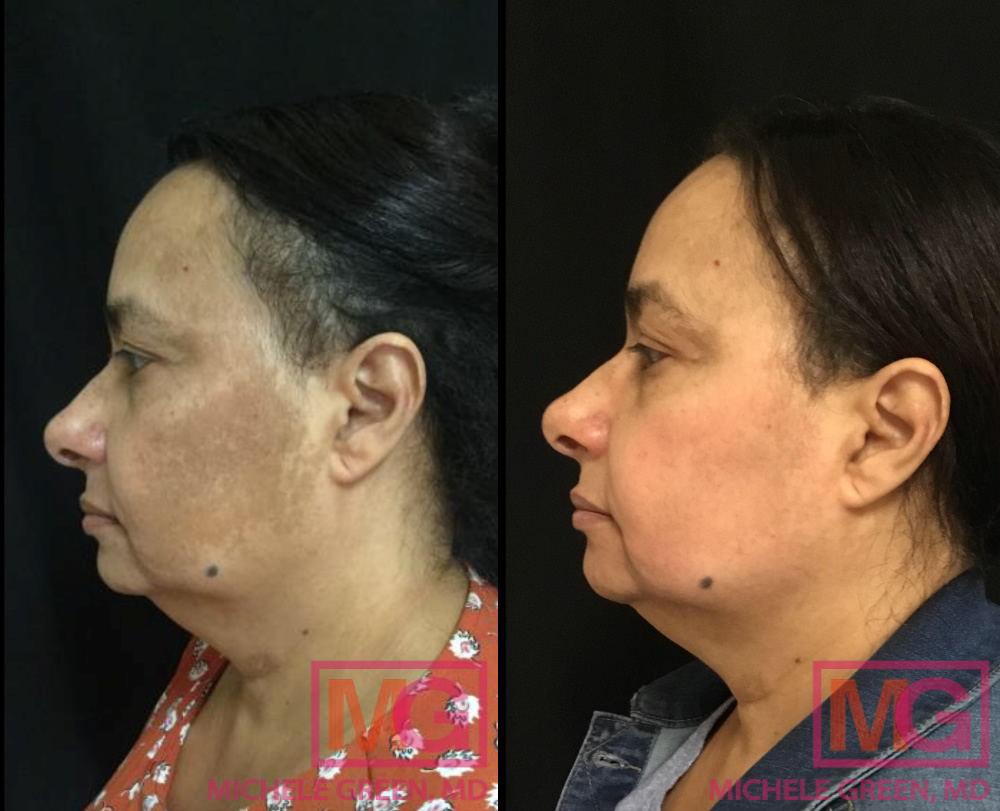
57 year old – Cosmelan for Melasma
FAQs about acne scar treatment for dark skin
Are acne scars the same as hyperpigmentation?
Hyperpigmentation is a general term used in dermatology to describe areas of skin that appear darker than the surrounding skin. Post-inflammatory hyperpigmentation is a specific type of hyperpigmentation that develops after an inflammatory skin condition like an acne breakout. Technically, post-inflammatory hyperpigmentation marks are not considered to be true acne scars, as they often clear up on their own; however, this process usually takes several months or sometimes years to resolve completely. A true acne scar is associated with permanent damage to the underlying skin tissue.
How do you get rid of acne scars on black skin?
The first step in getting rid of acne scars on black skin is to consult with a board-certified dermatologist like Dr. Green. Dr. Green is an expert in treating acne scars on black skin and often uses a combination approach of in-office treatments and targeted skincare products to quickly, safely, and effectively minimize the appearance of acne scars. Non-invasive procedures like the eMatrix laser, Clear + Brilliant laser, and microneedling can all help to resurface the skin and improve skin texture. Subcision with dermal fillers can break apart scar tissue and allow for new collagen production to occur in the area. Chemical peels can help gently and effectively address post-inflammatory hyperpigmentation associated with acne scars. Curated skincare items with essential ingredients such as vitamin C, retinol, hydroquinone, kojic acid, or alpha hydroxy acids can help brighten dark spots caused by acne. When you consult with Dr. Green, she will help create a customized treatment plan to leave you with clear, radiant skin that lasts.
Is laser treatment safe for darker skin tones?
As technological advancements in laser treatments continue to evolve in the field of cosmetic dermatology, laser skin resurfacing has become one of the most popular methods for removing acne scars. While non-invasive laser skin resurfacing can deliver remarkable results for many patients with minimal downtime, it is crucial to consider the safety and efficacy of a laser in relation to a patient’s skin tone. Many lasers use heat to stimulate collagen production — as melanin, the component responsible for skin pigment can also absorb heat; using excessive energy or overly high settings can result in skin damage in patients with darker skin tones. The treatment can then inadvertently result in hyperpigmentation, hypopigmentation, or even permanent scarring. As such, it is crucial to select a provider with the expertise and experience to choose appropriate laser settings that will safely and effectively reduce acne scars without causing any damage. Dr. Green is a world-renowned expert in cosmetic dermatology and a provider you can trust to deliver exceptionally outstanding results without the risk of unwanted side effects. At her private dermatology office in Manhattan’s Upper East Side, Dr. Green offers several laser therapy options that are safe and effective for patients with darker skin tones looking to diminish the appearance of acne scars.
Are chemical peels safe for darker skin tones?
Yes, chemical peels are a very safe and effective way to eliminate post-inflammatory hyperpigmentation and create a more even skin tone and texture. It is important to utilize an appropriate chemical exfoliant during treatment to ensure no adverse side effects occur. Trichloroacetic acid (TCA) is a popular chemical used during acne and acne scar treatment; however, TCA is typically not safe for darker skin, as it can increase the risk of hyperpigmentation or scarring with treatment. Instead, Dr. Green utilizes Mesopeels or Cosmelan peels for patients with dark skin, as these peels have been proven to rejuvenate the skin without any adverse side effects. Additionally, using sunscreen and practicing proper sun protection is crucial when undergoing a chemical peel to protect the sun from worsening pigmentation.
What fades scars on black skin?
Many patients in Dr. Green’s office ask, “How do you fade dark acne scars in patients with black skin?” Dark acne scars are a result of post-inflammatory hyperpigmentation that occurs when excess melanin is produced and accumulates in areas of inflammation as part of the skin’s natural wound-healing process. Luckily, the excess melanin stored in these areas will lighten over time as discolored and dead skin cells are naturally shed to reveal healthier, even-toned skin cells that the skin regularly produces. Although these dark marks will fade on their own, it can take a considerable amount of time, even months or years, for them to completely resolve without any intervention. If these hyperpigmented spots are treated correctly and professionally with cosmetic procedures and targeted skincare products, they may diminish much more quickly to reveal clear, healthy skin.
For patients with pigmented acne scars or post-inflammatory hyperpigmentation (PIH), Dr. Green frequently opts for chemical peels to diminish the hyperpigmentation. Chemical peels, such as the Cosmelan peel or the Mesopeel, safely and effectively lighten hyperpigmentation, offering patients a brighter, more even complexion. These peels are proven to be safe and effective in patients with black skin, improving the appearance of hyperpigmentation without the risk of scarring or further hyperpigmentation. When consulting with Dr. Green in her boutique dermatology office in NYC, she will assess your acne scars and develop a personalized treatment plan to improve your acne scars effectively.
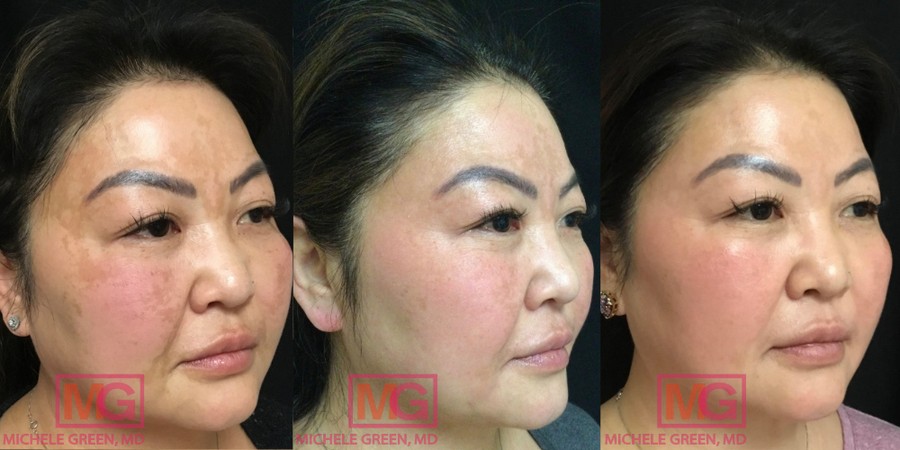
Cosmelan 3 and 6 weeks before and after
Do dark acne scars go away? How do scars heal on dark skin?
Dark marks that are left on the skin after acne breakouts and which are smooth against the surface of the skin, meaning that there is no textural difference between the hyperpigmented skin and surrounding skin, will typically resolve on their own with time. These dark marks, in particular, are associated with post-inflammatory hyperpigmentation. This skin condition results in excess melanin being produced and accumulated in areas of inflammation as part of the natural wound-healing process of the skin. The excess melanin that is stored in these areas of the skin will lighten over time as discolored and dead skin cells are naturally sloughed off to reveal healthier, even-toned skin cells that are being produced by the skin regularly. Although these dark marks will go away on their own, it can take a significant amount of time for them to resolve completely without any interference. If these hyperpigmented spots of skin are treated correctly and professionally, they may be diminished much more quickly than they would if left alone.
True acne scars are characterized by a textural abnormality in the skin, created by damage that is done to the follicle by inflammation. A dark mark that is atop the surface of a true acne scar may not resolve on its own and can require treatment in order to be reduced. It is considered more challenging to remove a true acne scar than it is to lighten areas of post-inflammatory hyperpigmentation.
How do you safely treat acne scars on black skin?
In order to remove acne dark spots or acne scars in patients with darker skin tones, the first step is often to begin the use of targeted, doctor-recommended skin care products. Curated skin care products with vital ingredients such as vitamin C, retinol, hydroquinone, kojic acid, or alpha hydroxy acids can help brighten acne-caused dark spots. Vitamin C is an antioxidant that protects the skin against sun damage by neutralizing free radicals caused by UV radiation, which can also exacerbate conditions like post-inflammatory hyperpigmentation. Vitamin C also promotes skin cell regeneration and collagen production to improve the texture and tone of the skin.
Dr. Green often recommends specially formulated skincare products from Mesoestetic to her patients interested in safely and effectively reducing dark spots and hyperpigmentation. Mesoestetic is a pharmaceutical company that manufactures some of the world’s best treatment options for discoloration, including Mesopeels, Cosmelan peel, and skin care products for at-home use. Some of their most popular skincare products include bleach-free depigmenting creams, serums, and sunscreen with high SPF. The Mesoestetic company is responsible for several innovative depigmentation products and treatments that have proven to be safe and effective for treating various skin conditions, including post-inflammatory hyperpigmentation and dark spots. Pairing the in-office treatment options with specially formulated skincare products for use at home helps patients achieve optimal and particularly long-lasting rejuvenation results.
When it comes to reducing discoloration of the skin that is associated with a healed active acne lesion, Dr. Green often recommends to her patients traditional and enhanced microneedling procedures, laser skin resurfacing, chemical peels, and steroid injections. In some cases, patients with atrophic scars can rely on dermal fillers (such as hyaluronic acid fillers) to restore collagen and volume to the skin, which in turn can reduce the appearance of indented scars. Patients who suffer from acne dark spots typically opt to build a treatment plan with Dr. Green that combines at-home and in-office treatments in order to quickly, safely, and effectively reduce the appearance of acne scars and related dark spots.
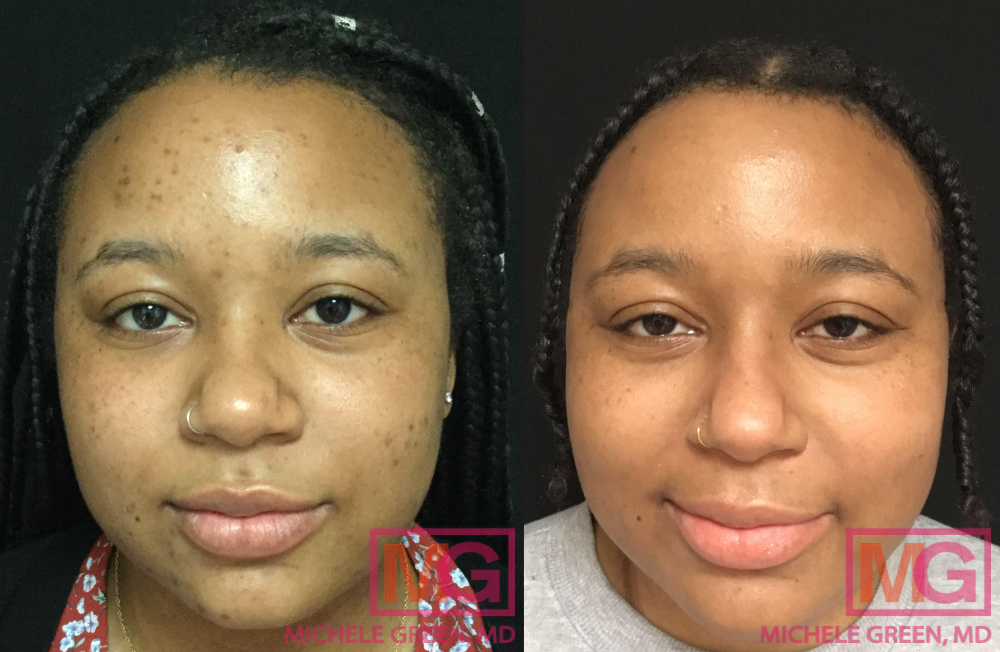
Acne and dark spot treatment – 7 months
How can I fade dark spots in 3 days in patients with dark skin?
Unfortunately, dark spots cannot fade within three days; all available treatments require time to be effective. Dark marks associated with post-inflammatory hyperpigmentation will resolve without treatment, though it may take months or years for the pigment to disappear fully. If you’re struggling with dark spots and want to lighten them quickly, the first step is to consult a board-certified dermatologist like Dr. Michele Green. In her private dermatology practice, Dr. Green utilizes various minimally invasive cosmetic procedures and prescription topicals to lighten dark spots, helping patients achieve brighter, more even skin.
What is the best product for dark acne scars?
It is hard to say what the best product is for reducing the appearance of dark acne scars. Typically, a combination approach that integrates both prescription and over-the-counter targeted skincare products is best for achieving optimal cosmetic results. Hydroquinone and retinol, for instance, are common ingredients in skincare regimens aimed at minimizing the appearance of dark acne scars due to their ability to lighten the skin and promote cell turnover, revealing new, healthy skin cells. Vitamin C is a powerful antioxidant that can help to gradually even out skin tone as well as skin texture. Furthermore, patients dealing with dark acne scars should always wear sunscreen. UV exposure from the sun increases melanin production, and any sun exposure can exacerbate hyperpigmentation. Patients prone to hyperpigmentation should use sunscreen with an SPF of 50 and reapply it every two hours while in the sun. After you consult with Dr. Green, she will help you develop a skincare regimen fitted with the most effective ingredients and products to get rid of your dark acne scars for good.
Is salicylic acid good for black skin?
Yes! Salicylic acid is a beta hydroxy acid (BHA) that is a powerful ingredient against comedonal acne, such as whiteheads and blackheads. Salicylic acid is oil-soluble and treats acne by gently chemically exfoliating the skin. Since it is oil-soluble, salicylic acid is able to penetrate deep within clogged pores and break up sebum. Salicylic acid can also help to soften skin texture and gradually reduce hyperpigmentation.
How to get started with acne scar treatment today
Acne scars can be a frustrating reminder of painful and bothersome acne breakouts, which are often even more challenging to treat than the acne lesions themselves. With an abundance of acne scar treatment options on the market, it can be hard to know what the best treatment is for your specific skin type, skin tone, and acne scars. Patients with darker skin tones must be especially careful in selecting appropriate acne scar treatments to avoid unwanted side effects, such as hyperpigmentation or keloid scarring, especially for patients with darker skin tones. Therefore, it is always advisable to consult an experienced, board-certified dermatologist, like Dr. Michele Green, for acne scar treatment. At her private dermatology practice in Manhattan’s Upper East Side, Dr. Green provides a variety of acne scar treatment options, including chemical peels, laser treatments, subcision with fillers, and microneedling, to help you achieve beautiful, radiant skin that lasts.
Dr. Green is a board-certified cosmetic dermatologist with over twenty-five years of experience in expertly treating patients of all skin types and tones from around the globe for acne, acne scars, and other skin conditions. She is consistently recognized as one of the top dermatologists by New York Magazine, Castle Connolly, The New York Times, and Super Doctors for her dedication to her patients and expertise. Dr. Green takes a holistic approach and embraces a less-is-more philosophy regarding rejuvenation, customizing each patient’s treatment plan to suit their specific concerns and personal aesthetic goals best. To schedule a consultation with Dr. Green and discover how you can safely and effectively eliminate your acne scars for good, please call our New York City-based dermatology office at 212-535-3088 or contact us online today.
 212-535-3088
212-535-3088